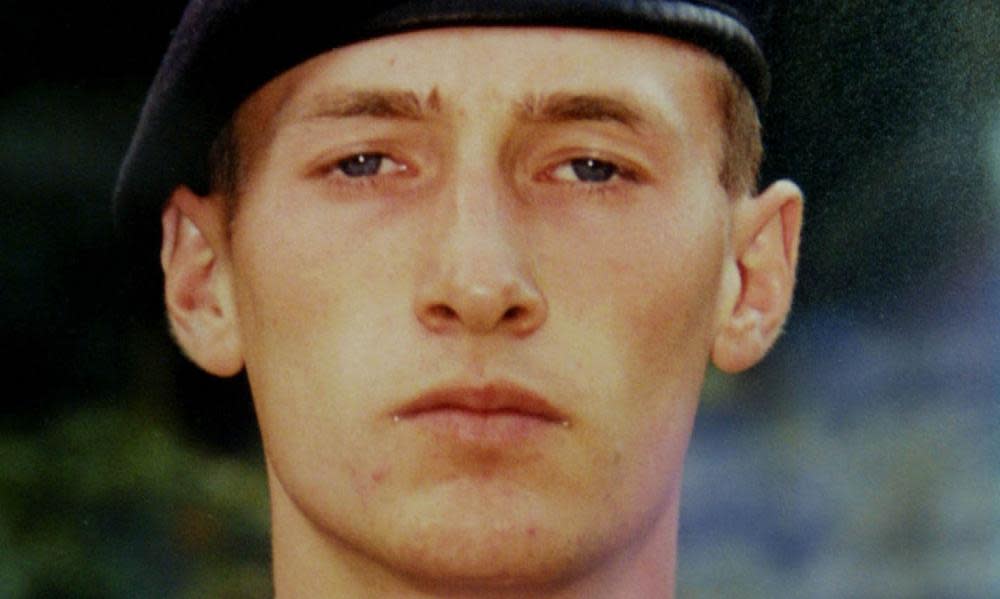Deepcut deaths: army ‘treating victims’ families with contempt’

Exclusive: Pte Sean Benton’s sister says MoD failed to honour pledge to tackle bullying at barracks
The sister of Pte Sean Benton, who committed suicide at Deepcut barracks, has accused the British army of treating victims’ families with contempt after it emerged that the military had failed to honour a pledge made at his inquest in 2018.
Tracy Lewis said the coroner had been told that recruits would be informed they could report serious physical or sexual assaults to the police, a commitment intended to help tackle bullying and harassment in the ranks.
But during follow-up inquiries made by Benton’s family this year, it emerged that the army had not acted as promised to the court, forcing the Ministry of Defence to apologise and belatedly rewrite its training materials.
“The army promised my family that they would ensure that trainees and recruits in the army today fully understand that if something bad happens to them – like a serious sexual or physical assault – that they can report to the civilian police and don’t have to go to the military authorities,” Lewis said.
“The evidence we heard at all the Deepcut inquests was that our young people just did not know they could do that and had nowhere to go for help. Now we learn, three years later, that the army did nothing. To our families, this feels like contempt.”
The inquest concluded that Benton, 20, had committed suicide at Deepcut barracks in Surrey in 1995. He had been found dead with five gunshot wounds to the chest. The inquest heard he had been repeatedly bullied. In one incident, he had told his sister that he had been “shackled and forced to parade around” a canteen.
Brig Christopher Coles, the head of army personnel service group, had told the coroner Judge Peter Rook QC that “an instruction will be sent” to army training centres requiring them to tell recruits they could complain to civilian police if they felt they had been a victim of a serious crime.
As a result of the public commitment, Rook said he would not make a formal prevention of future deaths report. The judge said he believed that the army had “relatively late in the day, recognised and addressed” the problem of recruits feeling they had nowhere to turn if they were assaulted.
Earlier this year, in June, Benton’s family asked the MoD to share with them copies of the revised induction materials, only for the army to concede that they did not exist.
Threatened with a judicial review, the MoD admitted this month it had made a mistake. “This is extremely regrettable and a matter for which the MoD would like to apologise to your client,” a government lawyer wrote. “I appreciate that this may not be much solace, but I can assure you that this was an oversight.” Training materials were being urgently rewritten, they added.
Benton was one of four soldiers who died in disputed circumstances at Deepcut barracks between 1995 and 2002. Initial investigations were criticised as inadequate and a 2006 review concluded that recruits had experienced “harassment, discrimination and oppressive behaviour”.
Earlier this month, Ben Wallace, the defence secretary, called a rare special meeting of the army’s management board in the aftermath of a series of bullying and harassment scandals and allegations that a Kenyan woman was killed in 2012 by a British soldier whose identity is known to several colleagues.
But Lewis said the army’s failure in her brother’s case raised questions about whether it was serious about reform. “There is so much in the press at the moment about unacceptable behaviours and the army wants us to believe that it will change. But how can we believe that, when the army can’t even do what it promised the court it would do?”
A Ministry of Defence spokesperson said: “We regret that we didn’t act quickly enough to make the changes to training we committed to, however, as part of basic training every recruit is now briefed on their right to report any issue to the civilian police.”
In the UK and Ireland, Samaritans can be contacted on 116 123 or email jo@samaritans.org or jo@samaritans.ie. In the US, the National Suicide Prevention Lifeline is 1-800-273-8255. In Australia, the crisis support service Lifeline is 13 11 14. Other international helplines can be found at www.befrienders.org.

 Yahoo News
Yahoo News 
